
Dark Side Of 'The Next AI Trade’: Welcome To The People’s Revolt
A public backlash is brewing against „The Next AI Trade” as power bills surge nationwide, especially in the Mid-Atlantic and Northeast areas, where the Mag 7’s massive CapEx boom is carpeting the region with data centers lined with rows of energy-hungry GPUs running chatbots and all things AI.
What we know so far is that we’re likely in the early innings of the revolt against the data center buildout supercharged by President Trump’s AI Stargate project, as alarming internet search trends show more and more Americans in these regions Googling about the surge in power costs over just a few short years, with some even resorting to apps like „Deferit” to split their power bills into four interest-free installments.
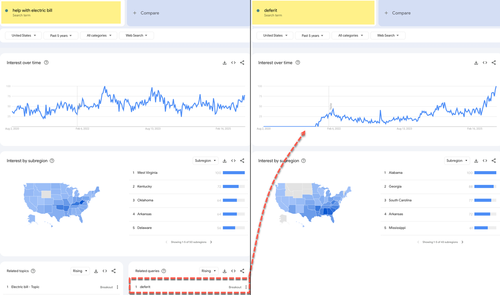
The epicenter of the people’s revolt against the massive expansion of AI data centers, gobbling up local resources like power, land, and water, began in Central Maryland, where residents first pushed back in summer of 2024 against the risk of losing their properties to make way for new transmission lines needed to power data centers in Northern Virginia.
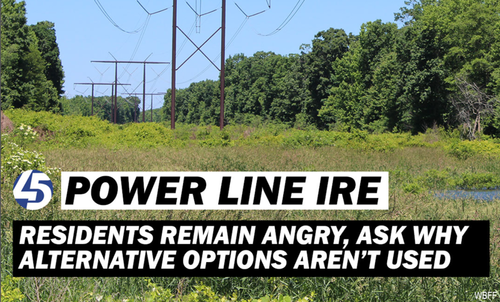
We first identified the 'dark side’ of 'The Next AI Trade’ one year ago:
- Dark Side Of 'The Next AI Trade’: Seizing Private Property For Transmission Lines
Next, the power bill crisis in Maryland: According to local news station WBAL, over 264,000 in Central Maryland are behind on their power bills, which represents roughly one-fifth of all Baltimore Gas and Electric customers.
Power bills are spiraling out of control in counties just north of Washington, DC, because far-left Governor Wes Moore and crazed progressive lawmakers in Annapolis prioritized failed 'green’ policies in the age of increasing baseload power demand from data centers, EVs, and other electrification trends.

The power crunch sparked by Democrats in Maryland is a „manufactured crisis” that has sent electric bills skyrocketing and crushed the pocketbooks of mom-and-pop businesses and working poor households the hardest. But it’s not just Maryland residents burned by soaring power costs and data centers gobbling up local resources… It’s happening in the Mid-Atlantic, Northeast, and other parts of the nation.
THREAD: The Maryland Freedom Caucus Was Right
For months, we warned that Maryland’s rush to shut down reliable power plants would lead to blackouts, rate hikes, and federal intervention.
Now PJM is confirming every word. pic.twitter.com/kc1YzN1i4V
— Maryland Freedom Caucus (@MDFreedomCaucus) July 24, 2025
One of the main forces driving the nationwide data center boom is the AI arms race with China. What U.S. Energy Secretary Chris Wright has dubbed America’s „next Manhattan Project” is aimed at keeping the U.S. ahead of China ahead of the 2030s.
U.S. hyperscalers are unleashing an ungodly amount of new capital towards the buildout of AI infrastructure nationwide.
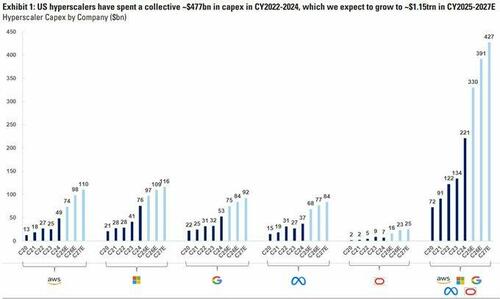
More power-intensive GPUs are coming online in the years ahead, as per a UBS note.
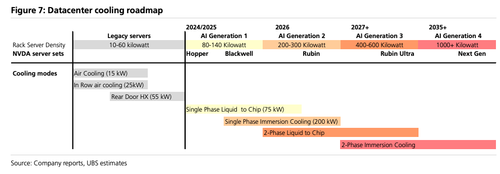
The timing of this buildout, as explained to us by one Blue Owl Capital executive, will remain in „sprint” mode through the end of the decade. Recall that Blue Owl is financing the massive AI data center in Abilene, Texas, the first Stargate project.
The rapid expansion of data centers has sparked local growing resistance, with 142 grassroots groups across 28 states now organized to block construction and expansion efforts. So far, these local groups have managed to block $18 billion worth of proposed data centers and delay another $46 billion.
New local resistance has also emerged in Arizona, with Tucson’s City Council recently voting unanimously to end all discussions with Beale Infrastructure regarding Project Blue, a proposed Amazon Web Services (AWS) data center complex.

Tucson’s City Council nuked Project Blue after weeks of intense public backlash, with residents protesting concerns over water use, environmental impact, and corporate secrecy.
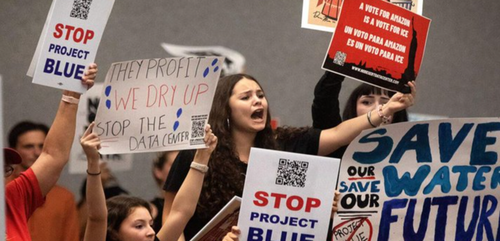
Here is the summary of what happened:
-
Unanimous Rejection: The 7–0 vote terminated the annexation process required to provide city water to the site and nullified a related land sale agreement with Pima County.
-
Public Outcry: Thousands attended three public meetings opposing the $3.6 billion project. Concerns included transparency, AI surveillance, low job creation, and high water and energy consumption.
-
Water Use Concerns: Documents revealed the two Tucson-area data centers would consume more water than four golf courses—up to 2,000 acre-feet annually, making them the city’s largest water customer.
-
Job Promises Scrutinized: Developers touted 3,000 temporary construction jobs and 180 permanent roles, but were only contractually obligated to hire 75.
-
Amazon Confirmed as Client: While cloaked in NDAs, Councilmember Rocque Perez confirmed AWS as the end user during the meeting.
-
Regulation Path Forward: Mayor Regina Romero proposed developing data center-specific regulations aligned with Tucson’s 2045 carbon neutrality goals. The Council agreed.
-
Larger Themes: Councilmembers criticized corporate influence, „tech bro” culture, and federal preemption over AI regulation. Some questioned the role of data centers in government surveillance and predictive policing.
-
Activism Victory: The No Desert Data Center Coalition hailed the vote as a win for environmental justice and community activism, vowing to remain vigilant against future attempts by Amazon or its partners.
-
Developers’ Next Steps: Beale Infrastructure hinted it may pursue similar projects in neighboring jurisdictions like Marana or Sahuarita.
What’s notable about Tucson is that it’s among the first cities to reject a major AWS data center during the Stargate data center boom, with residents choosing to prioritize water conservation and other local resources.
But Tucson is just one spoke in the wheel of nationwide local resistance gaining momentum. Add to that the Baltimore-area residents burned by soaring power bills and land grab threats, along with many others across the country who will eventually realize that their rising power costs stem from a combination of new data centers coming online and failed green energy policies. The lawmakers asleep at the wheel over a 'climate crisis’ hoax should’ve prioritized nuclear a decade ago for clean, reliable baseload capacity, not solar and wind, plus retiring reliable fossil fuel power generation was an epic mistake.
Tyler Durden
Sat, 08/09/2025 – 14:35















